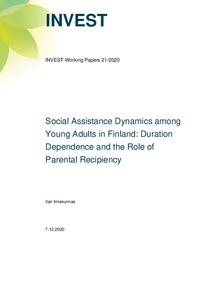Social Assistance Dynamics among Young Adults in Finland: Duration Dependence and the Role of Parental Recipiency
Ilmakunnas Ilari
https://urn.fi/URN:NBN:fi-fe2021042825737
Tiivistelmä
The probability of social assistance exit decreasing over time is called
negative duration dependence. This is one of the most debated aspects
of social assistance receipt. This study analyses duration dependence
among young adults in Finland and aims to show how social assistance
receipt per se affects the likelihood of exiting social assistance. It
also examines whether parental recipiency is associated with duration
dependence. While the intergenerational transmission of social
assistance has received extensive research attention, there is a
scarcity of evidence on whether parental recipiency is associated with
social assistance exits and duration effects. This study uses full
monthly history of social assistance receipt between ages 19 and 29. The
analyses are based on Finnish register data and conducted using
discrete-time event-history models (pooled logistic, random-effect
logistic and fixed-effect logistic). The findings indicate that
controlling for all time-invariant characteristics reduces but does not
completely remove duration dependence among young adults. They also show
that those whose parents received social assistance are less likely to
exit social assistance. In models controlling for all time-invariant
characteristics, parental social assistance receipt is also linked with
stronger duration dependence. The implications of these findings are
discussed.
Kokoelmat
- Rinnakkaistallenteet [27094]
